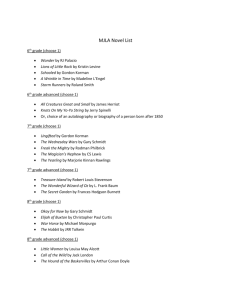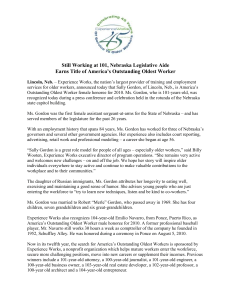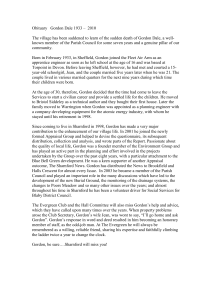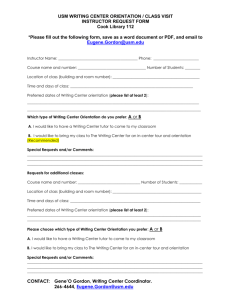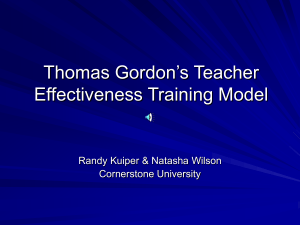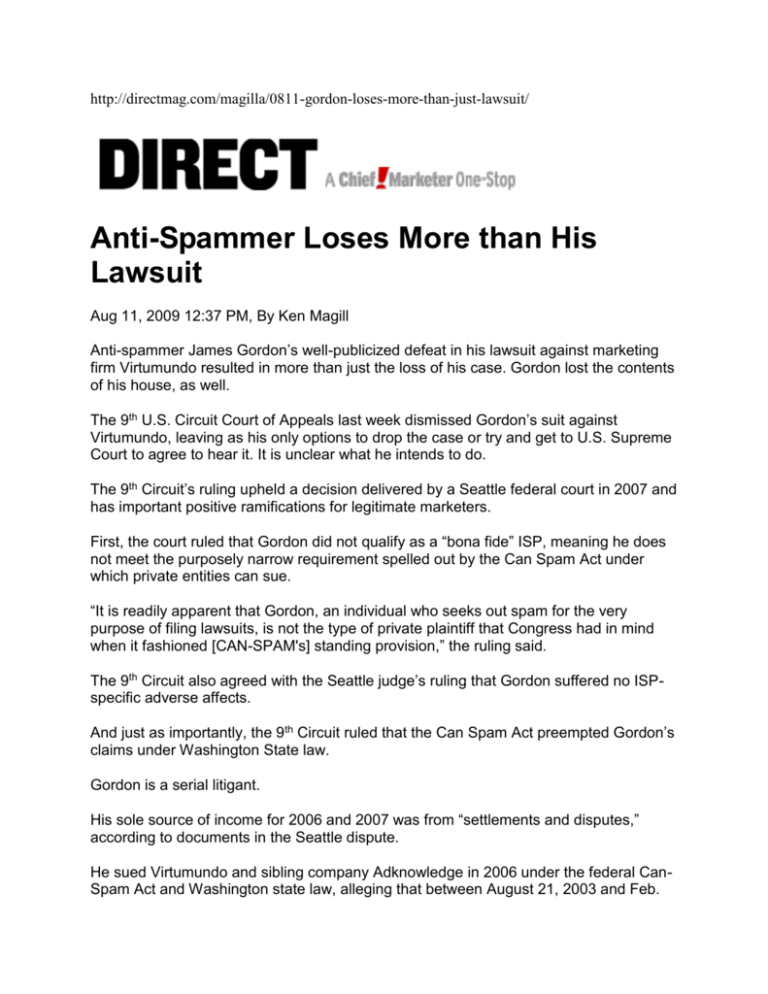
http://directmag.com/magilla/0811-gordon-loses-more-than-just-lawsuit/
Anti-Spammer Loses More than His
Lawsuit
Aug 11, 2009 12:37 PM, By Ken Magill
Anti-spammer James Gordon’s well-publicized defeat in his lawsuit against marketing
firm Virtumundo resulted in more than just the loss of his case. Gordon lost the contents
of his house, as well.
The 9th U.S. Circuit Court of Appeals last week dismissed Gordon’s suit against
Virtumundo, leaving as his only options to drop the case or try and get to U.S. Supreme
Court to agree to hear it. It is unclear what he intends to do.
The 9th Circuit’s ruling upheld a decision delivered by a Seattle federal court in 2007 and
has important positive ramifications for legitimate marketers.
First, the court ruled that Gordon did not qualify as a “bona fide” ISP, meaning he does
not meet the purposely narrow requirement spelled out by the Can Spam Act under
which private entities can sue.
“It is readily apparent that Gordon, an individual who seeks out spam for the very
purpose of filing lawsuits, is not the type of private plaintiff that Congress had in mind
when it fashioned [CAN-SPAM's] standing provision,” the ruling said.
The 9th Circuit also agreed with the Seattle judge’s ruling that Gordon suffered no ISPspecific adverse affects.
And just as importantly, the 9th Circuit ruled that the Can Spam Act preempted Gordon’s
claims under Washington State law.
Gordon is a serial litigant.
His sole source of income for 2006 and 2007 was from “settlements and disputes,”
according to documents in the Seattle dispute.
He sued Virtumundo and sibling company Adknowledge in 2006 under the federal CanSpam Act and Washington state law, alleging that between August 21, 2003 and Feb.
15, 2006, he and others received 13,800 misleading commercial e-mails from them at
his free e-mail service Gordonworks.com.
He sought more than $2.3 million in statutory damages.
However, the Seattle court tossed Gordon’s case and awarded Virtumundo $111,440 in
legal fees and expenses.
In a searing opinion, Justice John C. Coughenour of the U.S. District Court of the
Western District of Washington in Seattle, made clear that he believed Gordon was
engaged in an anti-spam racket and should be deterred him from pursuing 10 other
commercial-e-mail lawsuits he was pursuing in that court alone.
“First, it is obvious that plaintiffs are testing their luck at making their ‘spam business’
extraordinarily lucrative by seeking statutory damages through a strategy of spam
collection and serial litigation,” wrote Coughenour.
“Clearly, plaintiffs are assembling a litigation factory, which, if successful, could net
millions of dollars in profit, at least theoretically,” he wrote.
After the Seattle federal court’s decision, Gordon appealed to the 9th Circuit.
Virtumundo’s lawyer, Derek Newman, said after the Seattle court ruled in his client’s
favor, he sent the decision to collections.
“I’m not a collections attorney,” he said.
Virtumundo offered to stop trying to collect on the decision if Gordon would withdraw his
appeal, but Gordon refused, according to Newman.
When Virtumundo’s collections lawyer showed up at Gordon’s house with a moving van
and a sheriff, Virtumundo again offered to stop its pursuit of Gordon’s assets if he would
drop his appeal, and he refused again, according to Newman.
Virtumundo’s collections agency then cleared out Gordon’s house, according to
Newman.
He added that after seizing the contents of Gordon’s home, Virtumundo offered to return
Gordon’s belongings if he would drop his appeal and again, Gordon refused.
“The [9th Circuit] court found that Gordon’s claims were without merit [and were not] an
acceptable use of the court system and the law,” said Newman. “Hopefully, this decision
by the highest court in our federal circuit will put Mr. Gordon and all of the opportunists
in his position out of business.”
Newman added that he is defending seven other cases against Gordon, most of which
were stayed pending this decision. He said he will now reopen them in an attempt to get
them dismissed.
Gordon’s lawyer, Timothy Walton, verified the contents of Gordon’s home were seized.
He said he was unable to verify how many chances Virtumundo gave Gordon to drop
his appeal.
Walton, who has gone to court on behalf of many anti-spammers, said he believes the
9th Circuit’s decision sets an unreasonably high bar when it comes to Can Spam’s
preemption of state-law.
Congress intended Can Spam to supersede state e-mails laws except for cases of
falsity and deception, Walton said. However, the 9th Circuit’s ruling elevates the state
exception to cases of fraud, which means someone has to make a purchase and be
defrauded in order for the exception to apply.
“The 9th Circuit’s decision in Gordon vs. Virtumundo made the mistake of equating
falsity with fraud,” he said. “The result is a deterrent of people who want to stifle the use
of false advertising.”
© 2009 Penton Media, Inc. All rights reserved.


